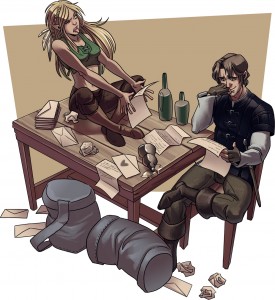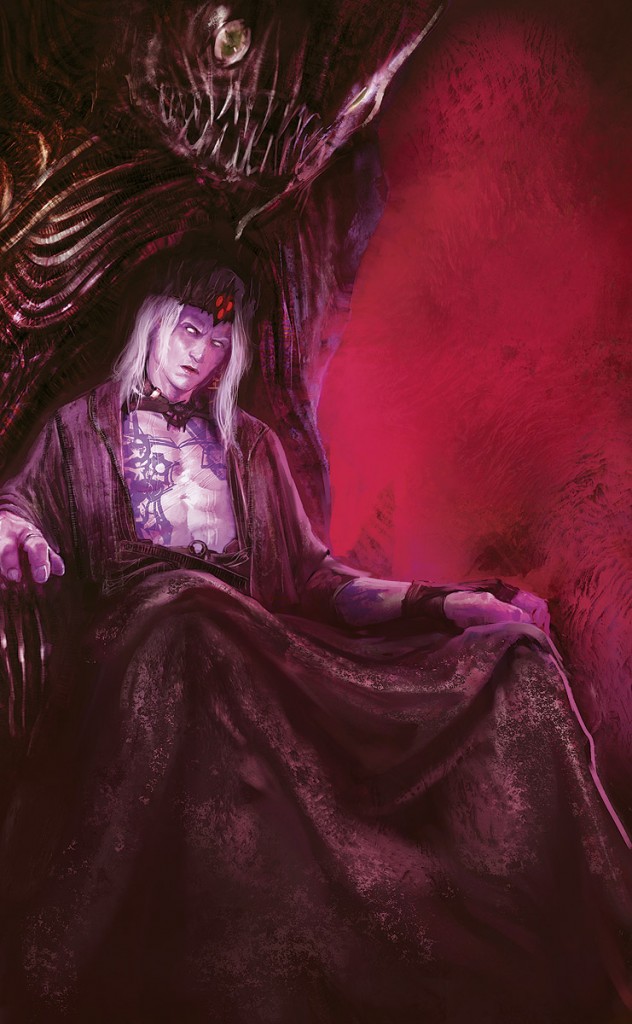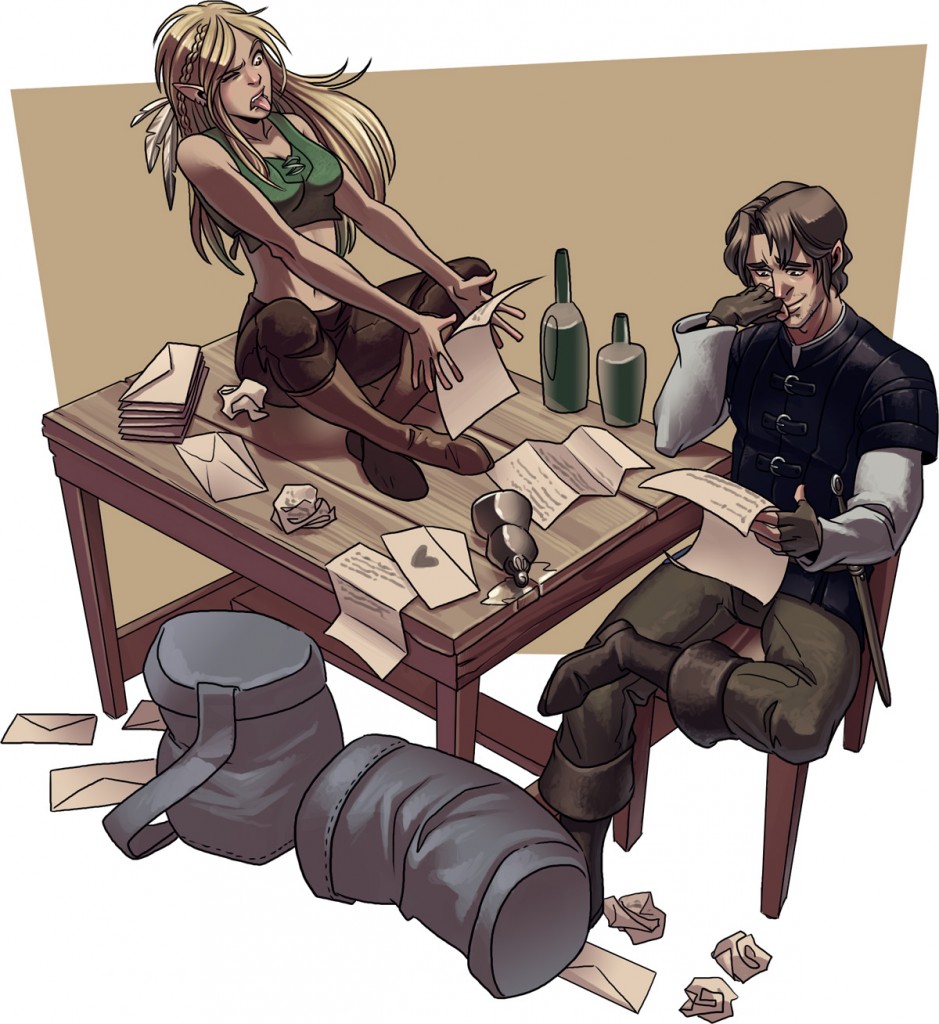Heaping Bones at the Feet of Kings
Every now and then, my wasting time on the internet will yield something useful beyond a slight increase of my already astonishing and sometimes frightening grasp of Taiwanese sensual arts. And almost always it comes from observing other people complain about things. It was while perusing Something Awful (which I am slowly becoming more convinced that most of my fellow authors are avid readers of) that I came across the inspiration for this blog post.
I’d been following a thread about fantasy book recommendations for awhile, noting who was recommended, nodding along. A lot of the same names kept cropping up: Joe Abercrombie, Scott Lynch, and the like. All good choices, all books I’ve adored, all authors I’m pleased to call friends. But as they kept popping up, I became aware of another recurring theme: the general idea of sifting diamonds from shit. The idea being that these names were the ideal diamonds was something I could agree with readily, but it was the idea that fantasy books, by and large, had a default status of “shit.”
It’s not an idea I hadn’t heard before. Occasionally, while at a party, conference or festival where one or more breeds of authors meet, I’ll hear it: the creaking of aged leather as a smile turns to a frown, the throaty rumble of a hesitant groan and those words.
“Oh…you write…fantasy?”
Always its own sentence in the statement, spoken with the same kind of severity and sympathy one usually saves for condolences over dire illnesses. Certainly, they like some fantasy: George R.R. Martin, Neil Gaiman, any other name that happens to be big enough for them to have caught and used as a buzzword. But generally, and they’re only rarely hesitant to tell me thus, the common viewpoint is that fantasy, by and large, is a churning cauldron of feces that occasionally produces a rare diamond that people happen to like enough to command attention.
This opinion (coming from them) does not bother me. If they don’t like fantasy, that’s fine. If they don’t get fantasy, that’s fine. If they don’t respect fantasy as writing, that’s fine. One writes for no one but oneself if one hopes to write anything true, after all.
But I’d be lying if I said the opinion didn’t bother me at all. Because there are certain circumstances in which it proves discouraging and it was that circumstance that was made evident when I was reading the thread.
When fantasy fans feel that fantasy’s default status is shit, that bothers me.
It’s not something I’ve bothered denying. It’s not something I’ve never thought myself. But the fact that it’s there troubled me enough to turn the question to readers. Specifically, my readers (since I didn’t have ready access to anyone else’s). I sent out on twitter: “People who are jaded toward fantasy: what is it about it that irritates you?” Admittedly, the question wasn’t phrased the best, since if they’re my readers, they likely aren’t jaded toward fantasy to the extent that troubles me.
But useful answers came back, which I really wish I had saved. There were a variety of answers with most at least dipping a toe into the same issue: fantasy feels too reminiscent of itself. Authors tended to echo each other in theme and language and style. Publishers tended to publish the same thing with different covers over and over. With the vast, limitless possibility of the human imagination and a genre whose name is carte blanche to use it, too many authors restricted themselves to the familiar.
#*!*#
See that series of nonsensical punctuation marks right there? I just made that up. I’m calling it a gronktrois. It is used to indicate when the speaker is aware he is about to say something that might irritate a lot of people.
But it has to be said: a lot of fantasy is inherently terrified.
Terrified of change, terrified of coming out and doing their own thing, terrified of going beyond the rules as laid down by tradition, terrified of alienating the readers, whatever. Point being, a lot of fantasy tends to be unwilling to explore, invent, frighten or do something that might fail. This overall terror, I think, manifests itself on three different levels: author, publisher and reader. And we’ll discuss them all.
#*!*#
Dang it.
Readers of my blog will probably not be surprised or amused to see me take an anti-establishment bent again and say we, as authors, tend to be crippled by tradition. There’s this supremely weird idea that you don’t just write fantasy for yourself, but for a long line of the authors that came before you (perhaps echoing herd behavior of tightening against perceived danger, such as the opinion of other authors) ultimately ending in Tolkien. Or maybe Howard, if you’re nasty. I get the idea of wanting to acknowledge authors who have influenced you, I even get the appeal of putting that in your book, but sometimes it feels as though it’s an unspoken rule that you must pay homage to Tolkien in lyricism, prose poetry, feast scenes, a fetish for short dudes, whatever.
Credit where it’s due, it’s not always about paying homage to Tolkien. Sometimes it’s about paying anti-homage (egomah?) or setting up the “traditions” specifically to be subverted and thus acknowledging tribute in that way. And sometimes it’s about paying homage to other authors.
Let me be frank and say that I love Scott Lynch. To death (investigation pending). I knew his literature long before I knew him and I’ll say now as I said then that The Lies of Locke Lamora is probably my favorite fantasy book of all. And in that time, there have been a lot of books about thieves, assassins, ne’er do wells who…all seem to do the exact same thing that Lies did. It’s not fair of me to say that people specifically set out to ape Lynch, as it would be totally unfair of me to say that Scott set expectations. An author’s work is always their own, regardless of what it may remind us of and an author owes no obligation, explanation or condensation to anyone but themselves. And yet, the expectations are there.
And they can be reinforced by publishers–
#*!*#
NO! No, this is not what you’re thinking. This is not a rant against publishers. This is not about railing against the man who has taken power from the authors. I love the man. The woman, too (since a few of my editors are). This nebulous, literary being has paid me money that I use to further my knowledge of Taiwanese sensual arts. I understand this creature, as it understands me, and we both understand that the publishing world has changed enough that a sure thing is a very, very appealing asset.
Now, granted, there’s no way to actually publish a sure thing. But you can do everything you can to try and make a sure thing. And that’s where we get things like “reminiscent of Lynch,” “avant Abercrombie,” and “the second head of Brent Weeks, begun as a tumor and given terrible sentience through dark ritual and sanguine powers” (that’s the blurb for my Whey of Shadows book, coming out this fall). With the publishing world forever changing, the idea of having something that taps into an idea or theme that’s already proven to have appeal can be rather sirenesque (that’s a word now!) in its ability to get publishers into it.
And yet, publishers are readers, just as writers are readers, and they all share the same lament: with the endless amount of tools at our disposal, we still tell the same story over and over.
#*!*#
#*!*#
This is not to say that we should feel all that guilty about enjoying certain things, as readers. This is not to say that enjoying one story about lovable, foul-mouthed thieves means we can no longer enjoy any other story about lovable, foul-mouthed thieves. But at the same time, we sort of have fallen into a position of comfort, haven’t we? We praise that which we already know we like, then wonder why publishers don’t publish different stuff and why writers aren’t writing new and exciting things.
It’s about here where it should be easy to launch into a frothy condemnation of how we’re not being challenged, terrified or otherwise having our jimmies rustled by literature. Not by coincidence, this is also where I start to contradict myself because, in a lot of ways, I don’t want that. I certainly want the challenge, I certainly want to be made to feel something by what I read, but I don’t want the author to set out to do that as a response to condemnation. I want the author to write for themselves and to be taken along with their vision. I want to share in their story because it resonates with me, not because it was designed specifically to incite an emotion (be it nostalgia or fear). I want to be a part of that story by choice, not by design.
And this is why I say I don’t want to think that my genre is shit by default, with each diamond being restructured, redesigned and losing a little more luster each time it’s reproduced. This is why I hope we someday reach the point where a story is taken on its own merits, rather than by what memories it evokes in us.
Or maybe that’s just me being pretentious.
What do you think?
Heaping Bones at the Feet of Kings Read More »




